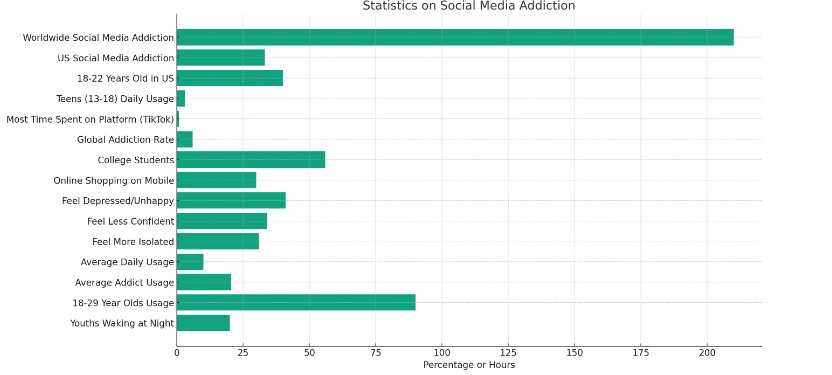
Social media addiction is becoming increasingly relevant in today’s digital world, where social media platforms have become central to our daily interactions. As a business coach who regularly shares insights on various topics on my blog, I, Gordon Grigg, have explored complex issues and their challenges in our personal and professional lives. While I’ve discussed various subjects, including addiction, the focus of today’s discussion is on the less talked-about yet equally significant issue of social media addiction.
With its vast array of networks, social media has transformed how we connect, share, and stay informed. However, the line between use and overuse can often become blurred, leading to potential addiction. This blog post aims to shed light on social media addiction, its impacts on various aspects of life, and effective strategies for managing and potentially overcoming it. Understanding the nature of social media addiction is crucial in today’s digitally dominated environment, allowing us to enjoy the benefits of these platforms while maintaining a healthy balance.
Understanding Social Media Addiction

While it may not be recognized as a distinct mental health disorder, it shares similarities with behavioral addictions. Like other addictive behaviors, social media addiction involves excessive and compulsive media use that interferes with daily life. Individuals who are addicted to social media may experience withdrawal symptoms when not using it, and despite the negative consequences, they may continue to use social networking sites and apps compulsively. It is important to recognize and understand this addiction to address its impact effectively.
Real case study: My Facebook Addiction Wasn’t My Fault
In high school, I found Facebook to be an escape from my introverted and socially awkward reality. I carefully crafted my online persona, showcasing my interests and connecting with people in ways I couldn’t face-to-face.
However, my harmless social media use soon turned into an addiction, affecting my attention span and mental health. The compulsive need to check notifications and the false sense of validation from likes and comments became overwhelming. Later, I learned that the addictive design of social media, with its dopamine-triggering notifications, was not my fault.
Authors like Max Fisher and Nicholas Kardaras highlighted how these platforms are engineered for addiction, adversely affecting mental well-being and leading to issues like poor academic performance and depression. This realization was crucial in my journey to overcome my Facebook addiction and reshape my engagement with social media.
Read the whole case study here
Defining Social Media Addiction

Social media addiction, also known as problematic social media use, refers to the excessive, compulsive, and problematic use of social media platforms such as Facebook, Instagram, Twitter, and Snapchat. It is characterized by the overuse of these platforms, leading to negative consequences in various aspects of life, including physical health, mental health, and interpersonal relationships. Individuals with social media addiction often find it challenging to control their usage, spending excessive amounts of time scrolling through news feeds, posting updates, or engaging in online activities.
Those addicted to social media may experience withdrawal symptoms when they attempt to reduce or stop their usage. These symptoms can include anxiety, irritability, restlessness, and a strong craving to return to social media. Additionally, individuals with social media addiction may prioritize social media use over other responsibilities, neglecting school, work, or personal relationships.
Addiction can have a significant impact on physical health as well. Spending prolonged periods sitting and engaging in sedentary activities, such as scrolling through social media feeds, can contribute to a sedentary lifestyle, leading to health issues such as obesity, diabetes, and cardiovascular problems. Moreover, excessive social media use can disturb sleep patterns, negatively affecting overall physical health and well-being.
It is important to note that social media addiction is not officially recognized as a mental health disorder in the Diagnostic and Statistical Manual of Mental Disorders (DSM-5). However, it exhibits behavioral patterns similar to other addictive disorders, demonstrating the need for awareness, intervention, and support for individuals struggling with this issue.
Reasons behind Social Media Addiction
There are several factors that contribute to the addiction. Firstly, social media platforms are designed to be highly engaging and pleasurable, making them difficult to resist. The constant availability of short videos, captivating images, and interactive features stimulates the brain’s reward system, releasing dopamine, a neurotransmitter associated with pleasure and positive reinforcement. This pleasurable feeling serves as a reward, reinforcing the behavior of using social media and contributing to addiction-like behaviors.
@robmulder88 Can you watch this whole video? #dopamine #socialmediaaddiction #tiktokaddiction #selfimprovement
♬ original sound – robmulder88 – Rob Mulder
Additionally, social media platforms use positive reinforcement techniques to encourage excessive use. Features such as likes, comments, and shares create a sense of social validation and connection. This positive reinforcement leads individuals to continue using social media, seeking more pleasurable feelings associated with social interaction and acceptance.
The amount of time spent on social media can also contribute to addiction. With the rise of smartphones and the increased accessibility of social media apps, people now spend more time on social media than ever before. The constant exposure to social media, combined with the reinforcing nature of positive feedback, creates a perfect storm for addiction.
Furthermore, the proliferation of social media over the last decade has transformed it from a recreational activity to a behavioral addiction for many individuals. As social media use has become normalized and integrated into daily life, excessive usage patterns have become more prevalent. This shift has led to an increased focus on understanding the impact of social media addiction and finding strategies for prevention and intervention. Understanding the reasons behind this addiction is crucial to addressing and managing this growing concern.
Recognizing the Symptoms of Social Media Addiction
To determine if you have succumbed to this addiction, it is important to be aware of the various symptoms associated with excessive social media use. While each individual may experience addiction differently, there are common signs that may indicate problematic social media use. By recognizing these symptoms, you can begin to evaluate your own social media habits and take steps toward creating a healthier relationship with your digital devices.
Common Signs of Excessive Social Media Use

- Spending whole months on social media, neglecting other activities and responsibilities
- Engaging in social media use for extended periods, exceeding the initial intention of use
- Feeling an uncontrollable urge to use social networking sites and apps, even in inappropriate or inconvenient situations
- Experiencing negative consequences due to excessive social media use, such as impaired social interaction, declining mental health, and physical health issues
- Developing withdrawal symptoms and anxiety when attempting to reduce or stop social media use
- Using social media as a primary coping mechanism for stress, anxiety, or other negative emotions.
- Excessive social media use, often characterized by these symptoms, can harm an individual’s life, affecting their mental, emotional, and social well-being. Recognizing these signs and seeking intervention to reclaim control over one’s social media usage and regain a healthy balance in life is crucial.
Impact on Daily Life and Relationships
The excessive use of social media can profoundly impact various aspects of daily life, including interpersonal relationships and social interaction. Addicted individuals may experience difficulties maintaining positive and meaningful connections with others. The time spent scrolling through social media feeds and engaging in online activities replaces face-to-face interaction, leading to a decline in real-life social skills.
Furthermore, excessive social media use can negatively affect romantic relationships, friendships, and family dynamics. It may lead to the neglect of personal relationships as individuals prioritize their virtual social network over real-world connections. This neglect can result in feelings of isolation, detachment, and resentment from loved ones.
In addition to interpersonal problems, social media addiction can also impact school and work responsibilities. Excessive use of social media can lead to decreased productivity, poor concentration, and neglect of academic or professional duties. Individuals may use social media to escape from real-life responsibilities, resulting in negative consequences that can impact their education, careers, and overall success.
It is important to recognize the impact that social media addiction can have on daily life and relationships. By understanding the negative consequences of excessive social media use, individuals can begin to take steps towards creating healthier habits, reclaiming their time, and nurturing real-life connections.
Deep Dive into Social Media Addiction Statistics

To further understand the extent of social media addiction, it is important to examine social media addiction statistics. By exploring these numbers, we can gain insight into the prevalence of this issue, its impact on individuals, and the demographics most affected.
- Prevalence and Demographics: An estimated 210 million people worldwide suffer from addiction to social media and the internet. In the U.S., about 10% or 33.19 million Americans are addicted to social media. Young social media users aged 18 to 22 account for 40% of all Americans addicted to social media. (Source)
- Teenagers and Social Media: Teens aged 13 to 18 years old average 3 hours and 1 minute per day on social media, with some spending up to 9 hours daily. The excessive use of social media is particularly harmful to teenagers’ mental health, worsening issues like body image for many teenage girls. (Source)
- Social Media Platform Usage: People spend the most time each month on TikTok, averaging 23 hours and 38 minutes. YouTube and Facebook follow closely in terms of monthly usage. This indicates that people are using social media more for content consumption than for communication. (Source)
- Global Statistics: The global rate of social media addiction is estimated at 6%. Around 56% of college students reported social media addiction. Additionally, 30% of online shopping purchases occur on mobile phones, reflecting the integration of social media into daily life.(Source)
- Usage and Mental Health: 41% of social media addicts feel depressed or unhappy after using social media, 34% feel less confident, and 31% feel more isolated. The average social media user spends about 2 hours and 25 minutes daily on these platforms, while addicts average 4 hours and 56 minutes. (Source)
- Youth and Social Media: 90% of young adults aged 18-29 use social media, indicating its pervasive role in the lives of the younger generation. Alarmingly, 20% of youths have woken up in the middle of the night to check social media.(Source)
These case studies and statistics illustrate the widespread nature of social media addiction and its significant impact on mental health and daily life.
Demographics Most Affected by Social Media Addiction

While social media addiction can impact people of all ages, young people, particularly young adults, are among the demographics most affected by this issue. The increased use of social media among young people, combined with their developing brain and social skills, makes them more susceptible to addiction.
According to social media addiction statistics, young adults have consistently shown higher levels of social media use compared to other age groups. This excessive use can be attributed to various factors, including the need for social validation, the desire to fit in, and the influence of peers. Young adults often seek connection, acceptance, and positive reinforcement, which social media platforms readily provide.
In addition to young adults, adolescents also face a significant risk of social media addiction. The impact of excessive social media use on adolescents is of particular concern, as they are at a crucial stage of physical and mental development. The pressures to conform, the desire for social acceptance, and the constant comparison to others that social media facilitates can profoundly impact their mental health, self-esteem, and overall well-being.
Recognizing the vulnerable demographics is essential to understanding the scope of social media addiction and implementing appropriate prevention and intervention strategies to address this issue effectively.
The Psychological Effects of Social Media Addiction
While social media addiction primarily manifests as a behavioral issue, it can have significant psychological effects. Understanding these effects is crucial to recognizing the impact of addiction on mental health and well-being.
Social Media and Its Influence on Mental Health

Excessive social media use can contribute to various mental health issues, including anxiety, depression, loneliness, and social anxiety. Constant exposure to carefully curated and idealized representations of others’ lives can lead to negative self-comparisons, foster feelings of inadequacy, and lower self-esteem.
Moreover, spending excessive amounts of time on social media can lead to a decline in real-life social interaction, resulting in increased feelings of social isolation and loneliness. The lack of meaningful interpersonal connections can further exacerbate mental health issues such as depression and anxiety.
In addition, social media addiction can disrupt sleep patterns, leading to poor sleep quality and, subsequently, impaired mental health. The excessive use of electronic devices, especially before bedtime, can interfere with natural sleep cycles, negatively impacting overall mental well-being.
It is important to recognize the negative impact of social media addiction on mental health and well-being. By understanding the psychological effects, individuals can take steps towards creating healthier digital habits and seeking appropriate support and treatment when necessary.
The Role of Dopamine in Social Media Use
Dopamine, often referred to as the “feel-good” neurotransmitter, plays a significant role in social media addiction. The brain’s reward system is activated during social media use, triggering dopamine release and creating a pleasurable feeling. This pleasurable feeling, coupled with positive reinforcement from social media platforms, contributes to addiction-like behaviors and excessive screen time.
According to research, using social media can affect dopamine levels in the brain and cause addictive behaviors. This dopamine-driven addiction can make it challenging for individuals to regulate their social media usage, as they are constantly seeking that pleasurable feeling associated with social media interaction, positive feedback, and validation.
The role of dopamine in social media addiction highlights the impact of neurochemistry on our behaviors and habits. By understanding the influence of dopamine reinforcement, individuals can begin to develop strategies to manage their social media usage and reclaim control over their digital lives.
Social Media Addiction and the Youth
Young adults and adolescents, in particular, are vulnerable to social media addiction due to various factors unique to their demographic.
How Social Media Affects Adolescents and Young Adults

Social media can have a profound impact on the lives of adolescents and young adults, affecting their social skills, mental health, and coping mechanisms. Excessive use of social media can hinder real-life social interaction, leading to a decline in social skills development. The time spent on social media often comes at the expense of face-to-face communication, impairing the ability to engage in meaningful conversations, interpret emotions, and build interpersonal relationships.
Moreover, the constant exposure to carefully curated images and videos on social media can negatively impact the mental health of young people. The continuous comparison to idealized lifestyles can lead to feelings of inadequacy, low self-esteem, and an increased risk of anxiety and depression. Young adults may feel pressure to conform to societal standards and may experience heightened levels of stress as a result of negative social media experiences, cyberbullying, or fear of missing out.
Additionally, social media often serves as a coping mechanism for young people, providing an escape from real-world problems and negative emotions. However, excessive reliance on social media for emotional regulation can lead to a cycle of dependency, where individuals turn to social media instead of developing healthy coping mechanisms.
Understanding how social media affects young people is crucial in providing tailored support, education, and intervention strategies to address social media addiction effectively.
Social Media’s Impact on a Child’s Body Image and Self-Esteem
Children, too, are not immune to the negative effects of social media addiction. Studies have shown that excessive social media usage among children can have detrimental effects on body image and self-esteem. The exposure to unrealistic and idealized body images often portrayed on social media platforms can lead to negative body image perceptions, body dissatisfaction, and unhealthy comparisons.
Children who spend excessive time on social media may develop skewed perceptions of beauty, feeling pressure to conform to unattainable standards. These negative perceptions of body image can not only impact their self-esteem but also contribute to mental health issues such as anxiety, depression, and eating disorders.
Moreover, social media has created a culture of seeking external validation, where children may rely on social media likes, comments, and followers as measures of self-worth. This overemphasis on external validation can lead to a fragile sense of self-esteem, as it becomes reliant on the opinions and feedback received through social media.
The impact of social media on a child’s body image and self-esteem highlights the need for education, media literacy, and positive reinforcement of self-worth. By promoting healthy body image ideals, fostering self-acceptance, and teaching emotional resilience, we can help children develop a positive relationship with social media and build a healthy sense of self.
Overcoming Social Media Addiction
Fortunately, social media addiction is not a permanent trap, and there are proven strategies to help individuals overcome this addiction and regain control over their digital lives.
Strategies to Curb Social Media Use
- Implementing a digital detox plan, which involves setting designated periods of time to stay away from social media and digital devices
- Setting clear boundaries and time limits on social media usage, ensuring that it does not encroach upon other responsibilities or activities
- Engaging in alternative activities, such as pursuing hobbies, spending time with loved ones, or exploring nature, to replace idle social media use
- Seeking professional help, such as therapy or counseling, for individuals who struggle to break free from the addiction on their own
- Joining support groups or online communities of individuals with similar struggles, providing a platform for sharing experiences, advice, and encouragement.
- These strategies can help individuals develop healthier digital habits, create a balance between real life and digital life, and reduce the negative impact of social media addiction.
Is it Possible to Fully Recover from Social Media Addiction?

Recovery from social media addiction is possible, but it requires dedication, commitment, and support. While complete abstinence from social media may not be feasible for everyone, it is possible to regain control over social media usage and establish healthy boundaries.
Individuals can fully recover from social media addiction by acknowledging the issue, seeking professional help if needed, and making lifestyle changes. By addressing underlying issues, developing coping strategies, and replacing excessive social media use with healthier alternatives, individuals can create a positive shift in their relationship with social media.
However, it is important to recognize that recovery from social media addiction is an ongoing process, as social media will continue to be a part of our lives. It requires constant awareness, monitoring, and adjustment of digital habits to ensure that social media usage remains within healthy boundaries.
With the right support, determination, and a commitment to change, individuals can overcome the addiction and regain control over their lives, focusing on real-world connections, personal growth, and overall well-being.
Conclusion

In conclusion, social media addiction is a real and growing concern in today’s digital age. It is important to recognize the signs and symptoms of excessive social media use and understand its impact on daily life and relationships.
According to the statistics, this addiction affects people of all demographics, but it has a particularly big impact on young people. The psychological effects of social media addiction, such as its influence on mental health and the role of dopamine, cannot be ignored. However, it is possible to overcome it with strategies to curb social media use. While a complete recovery may be challenging, it is essential to prioritize our mental well-being and find a healthy balance with technology. Let’s make a conscious effort to disconnect and focus on building meaningful connections in the real world. If you want to talk about this, Contact me today.


